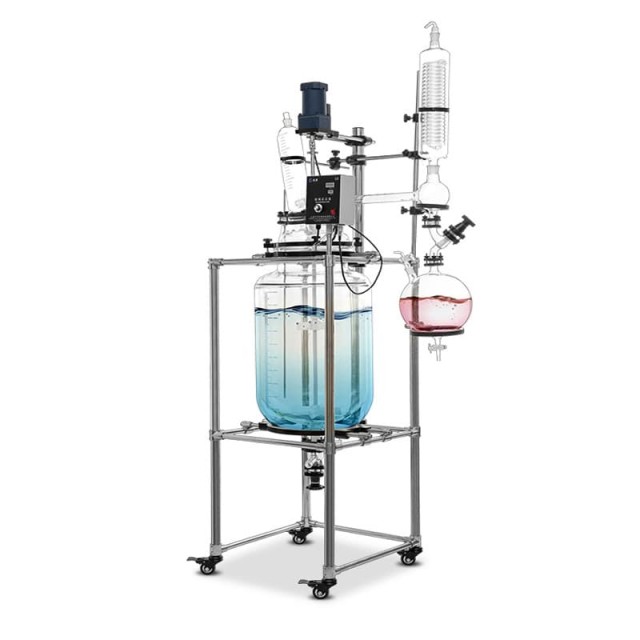
Glass Reactor
10-50L Jacketed Glass Reactor Vessel for Lab Applications
Item Number : KR-10
Price varies based on specs and customizations
- Reactor Volume
- 10-50 L
- Jacket Volume
- 3-16 L
- Max. Torgue
- 132-273 N/cm
- Stirring Speed
- 0-650 rpm
- Working temperature
- -80~250 ℃
- Vacuum
- 0.098 Mpa

Shipping:
Contact us to get shipping details Enjoy On-time Dispatch Guarantee.
Applications
Glass reactor system combines the glassware vessel, speed controlled stirring, controlled temperature heating or chilling, as while as filtering, lifting, or tilting mechanical functions, which creates an idea environment for the different target materials synthetic reaction, distillation, separation and filtration in the pharmaceutical, chemical, biological products and other industries.
KinTek glass reactors vessel volumes are from 1 liters to 200 liters,glassware can be single, double and triple jacketed, stirring system can be fixed speed or various speed adjustable, agitating shaft and impeller can be different materials or assembling, reactor assemble can be lift-able and tilt-able for convenient materials handling, standard input and output ports for heating or chilling circulating, also supply various optional functions like filtering assembling, anti-explosive controls, warm keep jacket, heating jacket and so on. Kindle tech also offer reactor custom tailor service, client just text us the working purpose and requests, we will work out detail plan proposals to our clients.
Features
- Hand-made food grade borosilicate glassware, high transparent, smooth fluid surface
- Wide range glassware temperature working adaptability , varies from -43°C up to 200°C
- Accurate stirring speed control and strong agitating power,guarantee the material even mixing
- Heavy duty and compact support framework design, durable working and space saving
- Solvent-resistant vales and sealing rings, make material reaction result more stable
- PTFE valve material prevent reacting with samples, keep the purity of sample material
- Multiple safety protections for dry running,over temperature and ground power failures
- Optional anti-explosive system, filtering system, warm keep jacket, heating jacket to meet particular working purpose
Technical specifications

| Model | KGR-10 | KGR-20 | KGR-30 | KGR-50 |
| Reactor Volume | 10L | 20L | 30L | 50L |
| Jacket Volume | 3L | 6L | 10L | 16L |
| Stirring Power | 60W | 90W | 180W | 180W |
| Max. Torgue | 132N/cm | 200N/cm | 200N/cm | 273N/cm |
| Port Sealing | PTFE | |||
| Speed Control | Knop Stepless Speed Regulation | |||
| Stirring Speed | 0-650rpm | |||
| Working temperature | -80~250℃ | |||
| Vacuum | 0.098Mpa | |||
| Safty Protection | Over-current/ ground fault/over-temperature protection | |||
| Working Environment | 5-35℃ | |||
| Power Supply | 110-440V, 50/60Hz | |||
| Overall Dimensions | 600*580*2000 mm | 700*580*2100 mm | 640*600*2280 mm | 700*630*2500mm |
| Net weight | 75kg | 125kg | 135kg | 140kg |
Warnings
Operator safety is the top important issue! Please operate the equipment with cautions. Working with inflammable& explosive or toxic gases is very dangerous, operators must take all necessary precautions before starting the equipment. Working with positive pressure inside the reactors or chambers is dangerous, operator must fellow the safety procedures strictly. Extra caution must also be taken when operating with air-reactive materials, especially under vacuum. A leak can draw air into the apparatus and cause a violent reaction to occur.
Designed for You
KinTek provide deep custom made service and equipment to worldwide customers, our specialized teamwork and rich experienced engineers are capable to undertake the custom tailoring hardware and software equipment requirements, and help our customer to build up the exclusive and personalized equipment and solution!
Would you please drop your ideas to us, our engineers are ready for you now!
FAQ
What Are The Main Types Of Laboratory Glassware?
What Is A Glass Reactor?
What Are The Applications Of Laboratory Glassware?
What Are The Advantages Of Glass Reactor?
What Are The Advantages Of Using Borosilicate Glass In Laboratory Glassware?
What Material Is Glass Reactor?
How Does Borosilicate Glass Enhance The Efficiency Of Laboratory Processes?
What Are The Different Types Of Glass Reactors?
What Makes PTFE Glassware Suitable For Handling Corrosive Substances?
What Temperature Should A Glass Reactor Be?
4.9
out of
5
KINTEK's glass reactors deliver precise temperature control, ensuring consistent reaction conditions.
4.8
out of
5
The customizable design of KINTEK's glass reactors makes them adaptable to various laboratory needs.
4.7
out of
5
KINTEK's glass reactors are built to last, offering exceptional durability and longevity.
4.8
out of
5
The wide range of sizes available in KINTEK's glass reactors allows for optimal selection based on specific process requirements.
4.9
out of
5
KINTEK's glass reactors are engineered with advanced technology, ensuring efficient and accurate performance.
4.7
out of
5
The corrosion-resistant design of KINTEK's glass reactors ensures long-lasting integrity in demanding environments.
4.8
out of
5
The versatility of KINTEK's glass reactors makes them suitable for a wide range of laboratory applications.
4.9
out of
5
KINTEK's glass reactors provide excellent temperature control, enabling precise reaction management.
4.7
out of
5
The compact design of KINTEK's glass reactors saves valuable laboratory space.
4.8
out of
5
KINTEK's glass reactors are easy to operate, simplifying laboratory procedures.
4.9
out of
5
The clear glass construction of KINTEK's reactors allows for visual monitoring of reaction progress.
4.7
out of
5
KINTEK's glass reactors are a cost-effective investment for laboratories.
4.8
out of
5
The modular design of KINTEK's glass reactors enables easy customization and expansion.
4.9
out of
5
KINTEK's glass reactors are built with high-quality materials, ensuring reliable performance.
4.7
out of
5
The user-friendly design of KINTEK's glass reactors minimizes training time for laboratory personnel.
4.8
out of
5
KINTEK's glass reactors are a valuable addition to any laboratory, enhancing productivity and efficiency.
REQUEST A QUOTE
Our professional team will reply to you within one business day. Please feel free to contact us!
Related Products
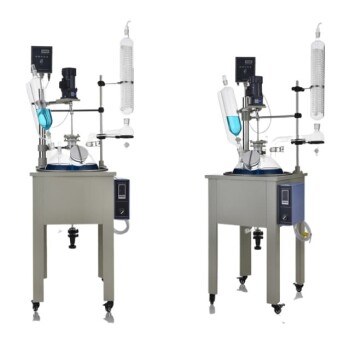
10-50L Single Jacketed Glass Reactor Vessel for Lab Applications
Looking for a reliable single glass reactor system for your lab? Our 10-50L reactor offers precise temperature and stirring control, durable support, and safety features for synthetic reactions, distillation, and more. KinTek's customizable options and tailored services are here to meet your needs.

Lifting Tilting Jacketed Glass Reactor Vessel for Lab Use
Enhance your synthetic reactions, distillation, and filtration processes with our lifting/tilting glass reactor system. With a wide range of temperature adaptability, accurate stirring control, and solvent-resistant valves, our system guarantees stable and pure results. Explore the features and optional functions today!

1-5L Jacketed Glass Reactor Vessel Lab Glass Reactor
Discover the perfect solution for your pharmaceutical, chemical, or biological products with our 1-5L jacket glass reactor system. Custom options available.

1-5L Single Jacketed Glass Reactor Vessel for Lab Use
Find your ideal glass reactor system for synthetic reactions, distillation, and filtration. Choose from 1-200L volumes, adjustable stirring and temperature control, and custom options. KinTek has you covered!
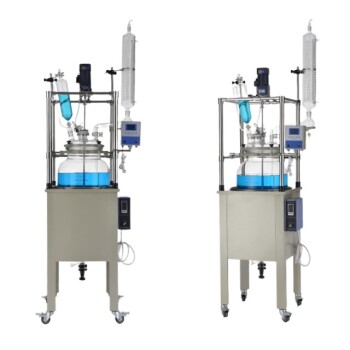
80-150L Single Jacketed Glass Reactor Vessel for Lab Use
Looking for a glass reactor system for your lab? Our 80-150L single glass reactor offers controlled temperature, speed, and mechanical functions for synthetic reactions, distillation, and more. With customizable options and tailored services, KinTek has you covered.
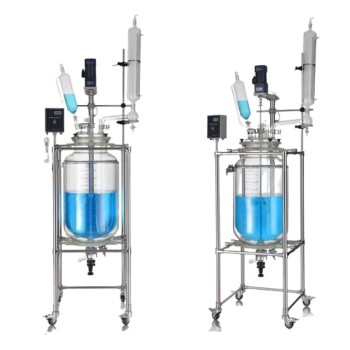
80-150L Jacketed Glass Reactor Vessel for Lab Applications
Looking for a versatile jacket glass reactor system for your lab? Our 80-150L reactor offers controlled temperature, speed, and mechanical functions for synthetic reactions, distillation, and more. With customizable options and tailored services, KinTek has you covered.

Molecular Distillation Equipment Short Path Molecular Distillation
Purify and concentrate natural products with ease using our molecular distillation process. With high vacuum pressure, low operating temperatures, and short heating times, preserve the natural quality of your materials while achieving excellent separation. Discover the advantages today!

Laboratory Vacuum Tilt Rotary Tube Furnace Rotating Tube Furnace
Discover the versatility of Laboratory Rotary Furnace: Ideal for calcination, drying, sintering, and high-temperature reactions. Adjustable rotating and tilting functions for optimal heating. Suitable for vacuum and controlled atmosphere environments. Learn more now!
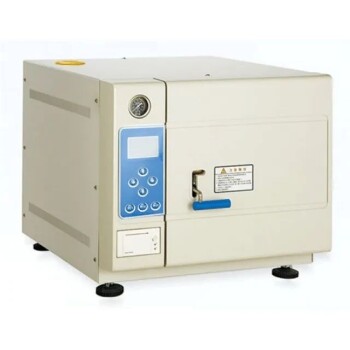
Desktop Fast Laboratory Autoclave Sterilizer 35L 50L 90L for Lab Use
The desktop fast steam sterilizer is a compact and reliable device used for rapid sterilization of medical, pharmaceutical, and research items. It efficiently sterilizes surgical instruments, glassware, medicines, and resistant materials, making it suitable for various applications.
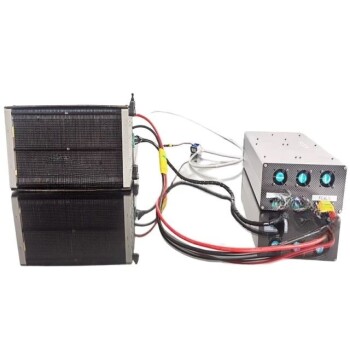
Hydrogen Fuel Cell Stack Battery Lab Equipment
A fuel cell stack is a modular, highly efficient way to generate electricity using hydrogen and oxygen through an electrochemical process. It can be used in various stationary and mobile applications as a clean and renewable energy source.
Related Articles

From Lab to Kitchen The Versatile Applications of Rotary Evaporator
A rotary evaporator, also known as a rotovap, is a laboratory device used for separating solvents from samples using evaporation. The device consists of a rotating flask and a condenser that is cooled by either air or water.

From Chemistry to Cooking The Versatility of Rotary Vacuum Evaporator
A rotary vacuum evaporator is a laboratory equipment that uses a rotating flask to remove solvents from a sample. It works by creating a vacuum in the system, which lowers the boiling point of the solvent and allows it to evaporate at lower temperatures.

Enhancing Safety in Your Laboratory: A Comprehensive Guide to Pressure Reactor Safety
Laboratory safety isn't just about you. Improper preparation and mishandling can cause potential hazards that could be disastrous if left unchecked. It is crucial to take the time to carefully prepare your pressure reactor and lab safety equipment, as even minor problems can escalate quickly when working under pressure.

10 Essential Safety Steps for Pressure Reactor Use in Laboratories
Safety is paramount when conducting chemical reactions under pressurized conditions. It is important to carefully prepare pressure reactors and laboratory safety equipment to prevent potential hazards that, if not controlled, can have catastrophic consequences. In order to ensure the safety of using a pressure reactor, it is important to understand the specifications of the reactor. Become familiar with the chemistry of the reactor material and make sure it is chemically resistant enough to withstand the substances used in the reaction.

Exploring the Boundless Possibilities of Rotary Evaporator in Culinary Arts
A rotary evaporator is an essential laboratory equipment that is used for solvent removal, separation, and recycling. It is a device that uses a rotating flask to remove solvents from a sample, making it ideal for sample preparations and drying powders.

A Step-by-Step Guide to Cleaning Laboratory Glassware
Maintaining clean and sterile glassware is crucial in any laboratory setting. Not only is it important for the accuracy and reliability of experiments, it is also essential for the safety of those working in the lab.

How To Clean Laboratory Glassware - Part 2
How To Clean Laboratory Glassware? Here are some considerations and tips.

How To Clean Laboratory Glassware - Part 1
Cleaning laboratory glassware isn't as simple as washing the dishes. Here's how to wash your glassware so that you won't ruin your chemical solution or laboratory experiment.

Safety Equipment In A Lab - Eye Protection
Safety glasses or chemical goggles must be donned before entering any wet bench lab, including cell culture labs. This applies to lab visitors, GT maintenance and custodial workers as well as staff and students.

Glassware vs. Plasticware - Which is the Better Choice for Your Needs?
Both glassware and plasticware have their own advantages and disadvantages, and the choice between the two will depend on the specific needs of your laboratory.

Exploring the Fundamentals of Good Laboratory Practice: Ensuring Quality, Integrity, and Safety in Scientific Research

CIP Revolutionizing the Manufacturing Industry
Cold Isostatic Pressing (CIP) is a manufacturing process that involves applying high pressure to a sample in a liquid medium to create a uniform and dense material.